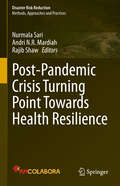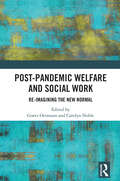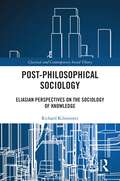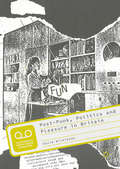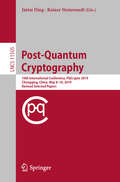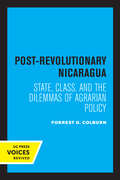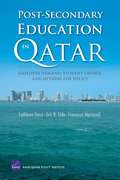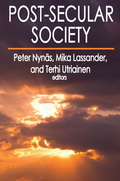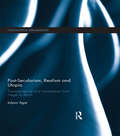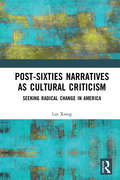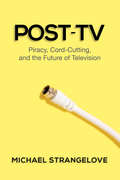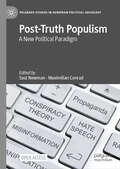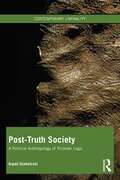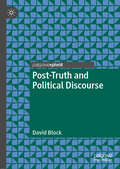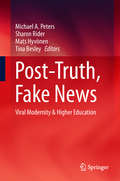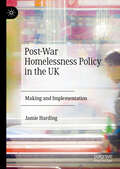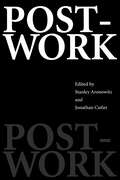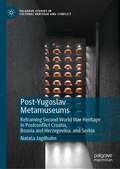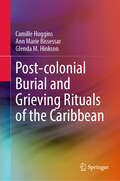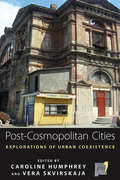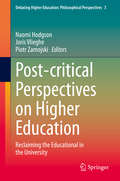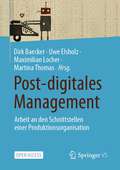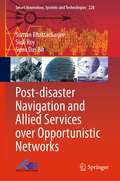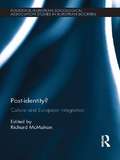- Table View
- List View
Post-Pandemic Crisis Turning Point Towards Health Resilience (Disaster Risk Reduction)
by Rajib Shaw Nurmala Sari Andri N.R. MardiahThis book shows how the public health crisis due to the Covid-19 pandemic becomes a momentum to transform health systems to be more resilient in developing countries. The book begins with a theoretical framework of managing public health crisis, then it explains what measures were taken in developing countries during the first wave. The experience forced all stakeholders to realise what was lacking with the health systems and why they needed initiatives to survive the crisis and transform the systems. In addition, the volume explains how developing countries set health system transformation as a policy agenda and what aspects of health system are reformed with the technology integrations. The volume ends with a future agenda that might work for future crises.
Post-Pandemic Welfare and Social Work: Re-imagining the New Normal
by Carolyn Noble Goetz OttmannThe COVID-19 pandemic represents a critical juncture in the development of the welfare state affirming its importance for its citizens’ economic, health and wellbeing, and safety especially for its most vulnerable populations. It demonstrated that the crisis preparedness that is crucial for an effective protection of its citizens, the ultimate purpose of the welfare state, unquestionably exceeds the narrow horizon of a corporatized welfare industry with its singular focus on the maximisation of profit for the elites and cost containment for the government. Social workers need to engage with the contradictions and tensions that spring from an underfunded welfare services and engage in the political struggle over a well-resourced welfare state. Contributors to this book take on this challenge. By tracing the various contradictions of the pandemic, the contributors reflect on new ways of thinking about welfare by exploring what to keep, what to challenge and what to change. By highlighting important challenges for a social justice-focused response as well as exploring the many challenges exposed by the pandemic facing social work for the coming decades, contributors critically outline pathways in social work that might contribute to the shaping of a less cruel and more capable welfare state. Using case-studies from Indigenous and non-Indigenous Australia, Italy, Slovenia, Estonia, Sweden, Spain, South Africa, Canada, Sri Lanka, Zimbabwe, China, and the US, the book features 19 chapters by leading experts. This book will be of interest to all social work scholars, students, and practitioners as well as those working in social policy and health more broadly.
Post-Philosophical Sociology: Eliasian Perspectives on the Sociology of Knowledge (Classical and Contemporary Social Theory)
by Richard KilminsterIn a hyper-individualistic age and in the face of the narrowly focused, policy-oriented research ubiquitous in the social sciences, this book revisits the humanistic world-view that is integral to Norbert Elias’s pre-eminent figurational-process sociology, with the aim of increasing the fund of sociological knowledge that has the human condition as its horizon. Clarifying the contentious ‘post-philosophical’ aspects in order to supplement standard histories of sociology with new insights, it offers incisive evaluations of some of the bewildered attempts by prominent sociologists to diagnose the malaise of contemporary globalised society. It also challenges the orthodox limitation of the empirical scope of sociology to ‘modernity’. With its ominous warnings of the destructive prevalence of ‘overcritique’ in the discipline and lack of in-depth sociological psychology, Post-Philosophical Sociology will appeal to scholars of sociology, psychoanalysis, social philosophy, cultural theory and social and political theory with interests in developmental and dynamic thinking and the history of the discipline.
Post-Punk, Politics and Pleasure in Britain
by David WilkinsonAs the Sex Pistols were breaking up, Britain was entering a new era. Punk's filth and fury had burned brightly and briefly; soon a new underground offered a more sustained and constructive challenge. As future-focused, independently released singles appeared in the wake of the Sex Pistols, there were high hopes in magazines like NME and the DIY fanzine media spawned by punk. Post-Punk, Politics and Pleasure in Britain explores how post-punk's politics developed into the 1980s. Illustrating that the movement's monochrome gloom was illuminated by residual flickers of countercultural utopianism, it situates post-punk in the ideological crossfire of a key political struggle of the era: a battle over pleasure and freedom between emerging Thatcherism and libertarian, feminist and countercultural movements dating back to the post-war New Left. Case studies on bands including Gang of Four, The Fall and the Slits and labels like Rough Trade move sensitively between close reading, historical context and analysis of who made post-punk and how it was produced and mediated. The book examines, too, how the struggles of post-punk resonate down to the present.
Post-Quantum Cryptography: 10th International Conference, PQCrypto 2019, Chongqing, China, May 8–10, 2019 Revised Selected Papers (Lecture Notes in Computer Science #11505)
by Rainer Steinwandt Jintai DingThis book constitutes the refereed proceedings of the 9th International Workshop on Post-Quantum Cryptography, PQCrypto 2018, held in Fort Lauderdale, FL, USA, in April 2018. The 24 revised full papers presented were carefully reviewed and selected from 97 submissions. The papers are organized in topical sections on Lattice-based Cryptography, Learning with Errors, Cryptanalysis, Key Establishment, Isogeny-based Cryptography, Hash-based cryptography, Code-based Cryptography.
Post-Revolutionary Nicaragua: State, Class, and the Dilemmas of Agrarian Policy (California Series on Social Choice and Political Economy)
by Forrest D. ColburnThis title is part of UC Press's Voices Revived program, which commemorates University of California Press’s mission to seek out and cultivate the brightest minds and give them voice, reach, and impact. Drawing on a backlist dating to 1893, Voices Revived makes high-quality, peer-reviewed scholarship accessible once again using print-on-demand technology. This title was originally published in 1986.
Post-Secondary Education in Qatar: Employer Demand, Student Choice, and Options for Policy
by Louay Constant Charles A. Goldman Cathleen Stasz Eric R. Eide Paco MartorellThe government of Qatar has made significant investments in post-secondary education to ensure that Qataris are able to contribute to the country's social and economic goals. The authors describe RAND's analysis of occupational demand and related post-secondary educational opportunities, and offer recommendations for improving the country's current provision of post-secondary education.
Post-Secular Society
by Gustaaf GeeraertsPost-Secular Society argues for several characteristics of the secular: the experience of living in a secular age and the experience of living without religion as a normal condition.Religion in the West is often seen as marked by both innovation and disarray. In spite of differing approaches and perspectives of secularization, rational choice and de-secularization, many scholars agree that the West is experiencing a general "resurgence" of religion across most Western societies.Post-Secular Society discusses the changes in religion related to globalization and New Age forms of popular religion. The contributors review religion that is rooted in the globalized political economy and the relationship of post-secularism to popular consumer culture. Also reviewed is innovative discourse as a religious belief system, theories of the post-secular, religious, and spiritual well-being, and healing practices in Finland and environmentalism. This paperback edition includes a new preface by Peter Nynas.
Post-Secularism, Realism and Utopia: Transcendence and Immanence from Hegel to Bloch
by Jolyon AgarThis book explores the contribution to recent developments in post-secularism, philosophical realism and utopianism made by key thinkers in the Hegelian tradition. It challenges dominant assumptions about what the relationship between religion and our so-called "secular age" should be that have sought to reduce or even eliminate religiosity from the public sphere. It draws upon utopian thinkers within the Hegelian tradition whose work has challenged this narrow secularism. In particular it explores the importance of philosophical transcendence to Hegelian and post-Hegelian religious, social and political theorising. This includes philosophers whose thinking is sympathetic or at least compatible with transcendence (such as Hegel, Taylor, Bhaskar and Bloch) but also those who have a reputation for rejecting transcendence and instead embracing immanence and even atheism (Feuerbach, Marx and Engels). By drawing on the utopian content of these thinkers it seeks to shed new light on the importance religious ideas have played in a range of philosophical positions within the broadly Hegelian tradition from theism, idealism, materialism and atheism to new ideas, especially new research on Hegel's so-called "panentheism". The book will be of interest to those working in the areas of post-secularism and utopian studies. It should also be of interest to academics and students of the recent turn within Critical Realism to "meta-reality" and its implications for Hegelianism and Marxism.
Post-Sixties Narratives as Cultural Criticism: Seeking Radical Change in America
by Lin XiangThis book examines the cultural criticism led by New York intellectuals from the 1960s onwards, considering the influence of such critique on American collective memory and contemporary public culture. With a focus on essays that appeared in Dissent magazine—one of the most important journals of the New York intellectuals—from the year of its launch in 1954 to its most recent issue, as well as representative books on American culture by Daniel Bell and Russell Jacoby, the author contends that post-Sixties narratives constitute a special paradigm of cultural criticism that seek radical possibilities for societal change in the US, based on a use of the 1960s as an index for understanding American cultural and political life. A study of the ways in which narratives can move beyond story-telling to have interpretative and ideological functions as a form of criticism, this book will appeal to scholars of cultural studies and sociology, as well as those working in the fields of linguistics and literary theory.
Post-TV
by Michael StrangeloveIn the late 2000s, television no longer referred to an object to be watched; it had transformed into content to be streamed, downloaded, and shared. Tens of millions of viewers have "cut the cord," abandoned cable television, tuned into online services like Netflix, Hulu, and YouTube, and also watch pirated movies and programmes at an unprecedented rate. The idea that the Internet will devastate the television and film industry in the same way that it gutted the music industry no longer seems farfetched. The television industry, however, remains driven by outmoded market-based business models that ignore audience behaviour and preferences.In Post-TV, Michael Strangelove explores the viewing habits and values of the post-television generation, one that finds new ways to exploit technology to find its entertainment for free, rather than for a fee. Challenging the notion that the audience is constrained by regulatory and industrial regimes, Strangelove argues that cord-cutting, digital piracy, increased competition, and new modes of production and distribution are making audiences and content more difficult to control, opening up the possibility of a freer, more democratic, media environment.A follow-up to the award-winning Watching YouTube, Post-TV is a lively examination of the social and economic implications of a world where people can watch what they want, when they want, wherever they want.
Post-Truth Populism: A New Political Paradigm (Palgrave Studies in European Political Sociology)
by Maximilian Conrad Saul NewmanThis open access book analyses the convergence between ‘post-truth’ political culture and the politics of populism. The premise is that there is an intrinsic link between post-truth discourse (referring to mis/disinformation, ‘alternative facts’, ‘fake news’, conspiracy theories and the general distrust of expert knowledge and official sources of information) and the central narrative of populism, which opposes the ‘common sense’ wisdom of ordinary honest people to the ‘expert knowledge’ of duplicitous technocratic elites. The book investigates the current post-truth phenomenon as a distinct feature of contemporary political life, and the specific ways in which it intersects with the resurgence of populism. While there has been a considerable literature on both post-truth and populism, they are largely treated as separate phenomena, and very little research has been conducted on their actual connection. The original contribution of this book to an emerging field of study is to develop a strong, coherent and empirically informed theoretical framework for understanding the specific paradigm of post-truth populism. The authors propose this paradigm as a way of interpreting different contemporary political phenomena, such as conspiracy theories, political destabilisation, and debates around immigration, the role of journalists and the media, climate change, gender and sexuality, Islam, and minority rights, as well as a way of understanding the threats and challenges this poses to the liberal democratic model and way of life.
Post-Truth Society: A Political Anthropology of Trickster Logic (Contemporary Liminality)
by Arpad SzakolczaiIt is widely asserted that we are now living in a post-truth society. What that means, this book argues, is that the contemporary global world is thoroughly infested not only with trickster figures but an entire and operational trickster logic; or, that we now live in a Trickster Land – an argument advanced by the claim that in modernity liminality has become permanent; or that modern life is patently absurd. The first part of the book presents a series of ‘guides’ to this condition, in the form of key thinkers and writers who can help us understand and navigate our Trickster Land. Such guides include Hermann Broch, Lewis Hyde, Roberto Calasso, Michel Serres, Sándor Márai, Colin Thubron and Albert Camus. The second part goes on to discuss five main regions of Trickster Land: art, thought, the economy, politics and society. This last, central chapter of the book contrasts trickster logic with the basic, foundational logic of social life, presented as gift-giving by Marcel Mauss and as sociability by Georg Simmel, and which is expressed here, combining Heraclitus and Plato with the Gospel of John, by three basic terms of ancient Greek culture, as arkhé charis logos: meaningful social life originally and in its essence is animated by the power of kind benevolence. This volume will appeal to scholars of social theory, anthropology and sociology with interests in political thought and contemporary culture.
Post-Truth and Political Discourse
by David BlockIn this book David Block draws on analytical techniques from Critical Discourse Studies to critically investigate truth, truths, the propagation of ignorance and post-truth. Focusing on corrupt discourses and agnotology, he explores the role of anti-intellectualism, emotion and social media in the cultural creation, legitimisation and dissemination of ignorance. While encompassing analysis of discourses on Donald Trump, Brexit, climate change and the Alt-Right, Block furthers our understanding of this global phenomena by providing a revealing analysis of political communications relating to corruption scandals involving the Spanish conservative party. Through an innovative theoretical framework that combines critical discourse and discourse historical approaches with nuanced political analysis, he uncovers the rhetorical means by which esoteric truths and misleading narratives about corruption are created and demonstrates how they become, in their turn, corrupt discourses. This original work offers fresh insights for scholars of Discourse Analysis, Sociolinguistics, Politics, Cultural and Communication Studies, and will also appeal to general readers with an interest in political communication and Spanish politics.
Post-Truth and Political Discourse
by David BlockIn this book David Block draws on analytical techniques from Critical Discourse Studies to critically investigate truth, truths, the propagation of ignorance and post-truth. Focusing on corrupt discourses and agnotology, he explores the role of anti-intellectualism, emotion and social media in the cultural creation, legitimisation and dissemination of ignorance. While encompassing analysis of discourses on Donald Trump, Brexit, climate change and the Alt-Right, Block furthers our understanding of this global phenomena by providing a revealing analysis of political communications relating to corruption scandals involving the Spanish conservative party. Through an innovative theoretical framework that combines critical discourse and discourse historical approaches with nuanced political analysis, he uncovers the rhetorical means by which esoteric truths and misleading narratives about corruption are created and demonstrates how they become, in their turn, corrupt discourses. This original work offers fresh insights for scholars of Discourse Analysis, Sociolinguistics, Politics, Cultural and Communication Studies, and will also appeal to general readers with an interest in political communication and Spanish politics.
Post-Truth, Fake News: Viral Modernity And Higher Education
by Michael A. Peters Sharon Rider Mats Hyvönen Tina BesleyThis edited collection brings together international authors to discuss the meaning and purpose of higher education in a “post-truth” world. The editors and authors argue that notions such as “fact” and “evidence” in a post-truth era must be understood not only politically, but also socially and epistemically. The essays philosophically examine the post-truth environment and its impact on education with respect to our most basic ideas of what universities, research and education are or should be. The book brings together authors working in Australia, China, Croatia, Romania, Canada, New Zealand, Portugal, Sweden, UK and USA.
Post-War Homelessness Policy in the UK: Making and Implementation
by Jamie HardingThis book discusses homelessness policy in the UK from 1945 to 2019. It identifies five key factors that have driven policy: the favoured explanations for homelessness, distinctions between different groups of homeless people, demand for social rented housing, geographical differences and the forms of prevention preferred by policy makers. The account analyses how these factors have influenced key pieces of legislation such as the 1948 National Assistance Act, the 1977 Housing (Homeless Persons) Act and the 2002 Homelessness Act. It also identifies the key issues that policy has sought to address at different times, including children being taken into care because of their parents’ homelessness, rough sleeping, the use of bed and breakfast hotels as temporary accommodation, social exclusion and welfare reform. In addition to published sources and archival material, the book draws on the experiences of two former Ministers and other key figures in the development of homelessness policy.
Post-Work
by Stanley Aronowitz Jonathan CutlerIn Post-Work, Stanley Aronowitz and Jonathan Cutler have collected essays from a variety of scholars to discuss the dreary future of work. The introduction, The Post-Work Manifesto,, provides the framework for a radical reappraisal of work and suggests an alternative organization of labor. The provocative essays that follow focus on specific issues that are key to our reconceptualization of the notion and practice of work, with coverage of the fight for shorter hours, the relationship between school and work, and the role of welfare, among others. Armed with an interdisciplinary approach, Post-Work looks beyond the rancorous debates around welfare politics and lays out the real sources of anxiety in the modern workplace. The result is an offering of hope for the future--an alternative path for a cybernation, where the possibility of less work for a better standard of living is possible.
Post-Yugoslav Metamuseums: Reframing Second World War Heritage in Postconflict Croatia, Bosnia and Herzegovina, and Serbia (Palgrave Studies in Cultural Heritage and Conflict)
by Nataša JagdhuhnThis book analyzes how Second World War heritage is being reframed in the memorial museums of the post-socialist, post-conflict states of Croatia, Bosnia and Herzegovina, and Serbia. It argues that in all three countries, a reluctance to confront undesirable parts of their national histories is the root cause explaining why the state-funded Second World War memorial museums remain stuck in the postsocialist transition. In most cases, Second World War museums, exhibitions, and displays conceived in the Yugoslav period have been left unchanged. However, there are also examples where new sections were added to the old ones and there are a small number of completely reconceptualized permanent exhibitions. The transitional position of the Second World War museums has made it possible to view these institutions as historical formations in their own right. The book will appeal to students and academics working in the fields of heritage and museums studies, memory studies, and cultural history of Southeast-Europe.
Post-colonial Burial and Grieving Rituals of the Caribbean
by Ann Marie Bissessar Camille Huggins Glenda M. HinksonThis book brings together anthropological and historical studies that analyze burial rituals within the Caribbean through the theoretical lens of syncretism and the hybridization of post-colonial and contemporary time periods. Based on oral historiography, historical document analysis and ethnographic interviews, the chapters in this volume outlay the creolization of ancestral burial rituals in the wider Caribbean and present case studies of eight Caribbean countries: Barbados, Haiti, Grenada, Guyana, Suriname, St. Lucia, St. Vincent and Trinidad and Tobago. This contributed volume is edited by scholars from different disciplines such as social work, psychology, and political science, providing an interwoven lens of individual human, political and environmental contexts. Contributing authors are from diverse disciplines such as anthropology, communications, sociology, political science, social work, and psychology and each discipline approaches the subject matter through their perspective lenses. Each chapter analyzes the hybridity of the burial rituals in the construction of culture and identity within conditions of colonial antagonism and inequity and is rich with oral histories from lay community historians, firsthand accounts, and historical texts. Post-colonial Burial and Grieving Rituals of the Caribbean will be of interest to scholars of cultural and religious anthropology, history and sociology, as it highlights the importance of grief and shows how it is encapsulated into burial traditions that are transmitted intergenerationally and express important aspects of Caribbean cultures.
Post-cosmopolitan Cities
by Caroline Humphrey Vera SkvirskajaExamining the way people imagine and interact in their cities, this book explores the post-cosmopolitan city. The contributors consider the effects of migration, national, and religious revivals (with their new aesthetic sensibilities), the dispositions of marginalized economic actors, and globalized tourism on urban sociality. The case studies here share the situation of having been incorporated in previous political regimes (imperial, colonial, socialist) that one way or another created their own kind of cosmopolitanism, and now these cities are experiencing the aftermath of these regimes while being exposed to new national politics and migratory flows of people.
Post-critical Perspectives on Higher Education: Reclaiming the Educational in the University (Debating Higher Education: Philosophical Perspectives #3)
by Naomi Hodgson Joris Vlieghe Piotr ZamojskiThis book addresses essential educational dimensions of the university that are often overlooked, not only by prevailing discourses and practices but also by standard critical approaches to higher education. Each chapter takes a different approach to the articulation of a ‘post-critical’ view of the university, and focuses on a specific dimension, including lectures, academic freedom, and the student experience. The ‘post-critical’ attitude offers an affirmative approach to the constitutive educational practices of the university. It is ‘post-’ because it is a movement in thought that comes after the critical, which, in its modern and postmodern forms is considered, in Latour’s terms, to have ‘run out of steam’. It is an attempt to articulate new conceptual and methodological tools that help us grasp our current conditions. It is not anti-critique; but rather than seeking to debunk current practices, this affirmative approach offers perspectives that shed new light on what we do as educators, on the essence of our educational practices, and on their immanent value. The focus on the educational, then, applies not only to practices that happen to take place in the educational space of the university, but also to those practices whose value we can understand in educational terms.
Post-digitales Management: Arbeit an den Schnittstellen einer Produktionsorganisation
by Dirk Baecker Uwe Elsholz Maximilian Locher Martina ThomasDiese Open-Access-Publikation handelt von Digitalisierungsprojekten in kleinen und mittleren Unternehmen. Es werden Forschungsergebnisse und Praxisbeobachtungen in Beiträgen, Interviews und Handouts von Wissenschaftlern und Praktikern präsentiert.
Post-disaster Navigation and Allied Services over Opportunistic Networks (Smart Innovation, Systems and Technologies #228)
by Siuli Roy Sipra Das Bit Suman BhattacharjeeThis book provides the details of developing a digital pedestrian map construction system over the intermittently connected mobile network. Over the past couple of decades, countries across the world, both developing and developed, have witnessed a significant number of disasters. Thus, it has become mandatory for each of the disaster-prone countries to equip themselves with appropriate measures to cope with the challenges of providing post-disaster services. Some of the serious challenges are incapacitated communication infrastructure, unstable power supply and inaccessible road networks. Out of these challenges, the destruction of road networks, especially in developing countries, acts as a major hindrance to effective disaster management. To be more specific, the success of a disaster response operation generally depends on the speed of evacuation and transportation of adequate amount of relief materials at the right time to the disaster-affected areas. Hence, map-based navigation support is a primary requirement for post-disaster relief operations. This book also provides the solution of the two other important post-disaster management services such as situational awareness and resource allocation. Both of these services are invariably dependent on the existence of navigation support. Finally, in order to offer such services, the other challenge is to address the problem of incapacitated communication infrastructure. This book also deals with such challenges in post-disaster scenarios and develops automated post-disaster management services.
Post-identity?: Culture and European Integration (Studies in European Sociology)
by Richard McMahonCollective identity, the emotionally powerful sense of belonging to a group, is a crucial source of popular legitimacy for nations. However efforts since the 1990s to politically support European integration by using identity mechanisms borrowed from nationalism have had very limited success. European integration may require new, post-national approaches to the relationship between culture and politics. This controversial and timely volume poses the logical question: if identity doesn't effectively connect culture with European integration politics, what does? The book brings together leading scholars from several of the disciplines that have developed concepts of culture and methods of cultural research. These expert interdisciplinary contributors apply a startling diversity of approaches to culture, linking it to facets of integration as varied as external policy, the democratic deficit, economic dynamism and the geography of integration. This book examines commonalities and connections within the European space, as well as representations of these in identity discourses. It will be useful for students and scholars of sociology, geography, anthropology, social psychology, political science and the history of European integration.
